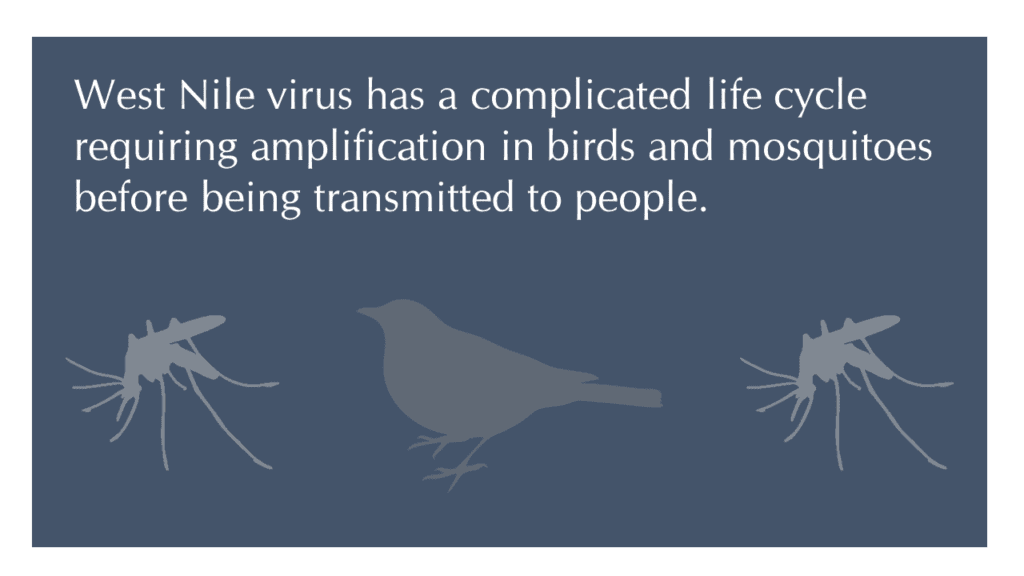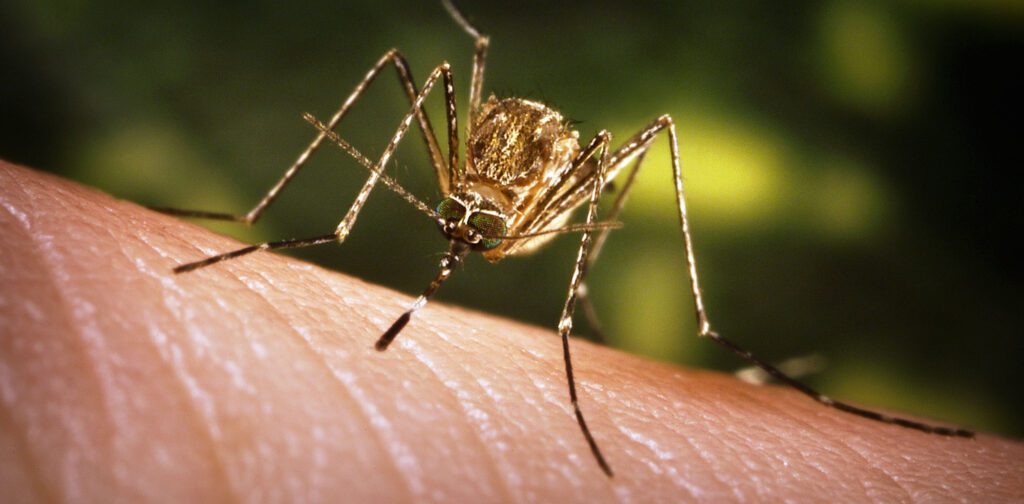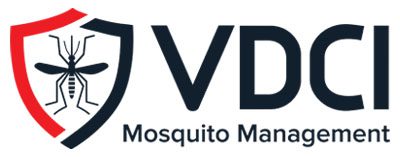The Spread of West Nile virus
Prior to 1999, you had probably never heard of West Nile virus, and in fact, until then it was virtually unknown in the US. However, that year 62 human cases, 25 horse cases, and countless bird diagnoses were reported in New York state. Since that time the virus quickly spread throughout the country and has been documented in all of the lower 48 states, affecting more than 40,000 people.
While the effects of West Nile virus on human populations have been studied in great detail, and we have a fairly good understanding of its impact on human health, we are only recently starting to understand how it can make changes to bird populations and the larger ecosystem.
Like many mosquito-borne pathogens, West Nile virus has a complicated life cycle requiring amplification in birds and mosquitoes before being transmitted to people. For a person to become infected, they must be bitten by a mosquito that has previously fed upon an infected bird. It is also important to note that not all mosquito species are capable of carrying the virus, although documented in greater than 150 species.

The majority (80%) of people infected with West Nile virus will experience no symptoms, but it is possible for this disease to be debilitating and even deadly. Approximately 20% of people affected by the virus will experience flu-like symptoms including fever, headache, nausea, muscle pain, and swollen lymph glands. An even smaller proportion of people (1 in 150) will develop West Nile Encephalitis or Meningitis, which can be life-changing and lead to disorientation, coma, tremors, convulsions paralysis, and even death.
While the majority of funding for West Nile mosquito surveillance and control targets protecting human health, it is important to note that humans are not the only animals infected. A recent study by researchers at Colorado State University indicates that bird populations are, and continue to be, hit heavily by the disease, and the consequences of this can have a significant impact on the ecosystem at large.
 When a new disease enters an area, disease ecologists expect to see major die-offs in the first year. However, over time, the impact of the disease is expected to decrease as the host population experiences increased immunity and can recover. Using data collected from over a quarter of a million birds belonging to 49 species, researchers have found that about half of the avian species affected by West Nile virus have made a recovery; however, the other half are continuing to experience major decreases in their population. Given the additional pressures on bird populations throughout the United States, of climate change, altered land use patterns, and feral cats, the added impact of West Nile on these populations is concerning.
When a new disease enters an area, disease ecologists expect to see major die-offs in the first year. However, over time, the impact of the disease is expected to decrease as the host population experiences increased immunity and can recover. Using data collected from over a quarter of a million birds belonging to 49 species, researchers have found that about half of the avian species affected by West Nile virus have made a recovery; however, the other half are continuing to experience major decreases in their population. Given the additional pressures on bird populations throughout the United States, of climate change, altered land use patterns, and feral cats, the added impact of West Nile on these populations is concerning.
Why so many bird species are unable to recover from the effects of West Nile virus is currently unknown. But when we think about the effects of mosquito-borne diseases decreasing the population of any species by 8-10% per year, it is quite shocking and should give us all reason for concern. As biologists attempting to control these vector-borne diseases, it is important that we consider not only the effects of the disease on human populations but other animal populations and the greater ecosystem as well.
Contact Us to Learn More About Effective Mosquito Management Strategies:
 Since 1992, Vector Disease Control International (VDCI) has taken pride in providing municipalities, mosquito abatement districts, industrial sites, planned communities, homeowners associations, and golf courses with the tools they need to run effective mosquito control programs. We are determined to protect the public health of the communities in which we operate. Our mosquito control professionals have over 100 years of combined experience in the field of public health, specifically vector disease control. We strive to provide the most effective and scientifically sound mosquito surveillance and control programs possible based on an Integrated Mosquito Management approach recommended by the American Mosquito Control Association (AMCA) and Centers for Disease Control and Prevention (CDC). VDCI is the only company in the country that can manage all aspects of an integrated mosquito management program, from surveillance to disease testing to aerial application in emergency situations.
Since 1992, Vector Disease Control International (VDCI) has taken pride in providing municipalities, mosquito abatement districts, industrial sites, planned communities, homeowners associations, and golf courses with the tools they need to run effective mosquito control programs. We are determined to protect the public health of the communities in which we operate. Our mosquito control professionals have over 100 years of combined experience in the field of public health, specifically vector disease control. We strive to provide the most effective and scientifically sound mosquito surveillance and control programs possible based on an Integrated Mosquito Management approach recommended by the American Mosquito Control Association (AMCA) and Centers for Disease Control and Prevention (CDC). VDCI is the only company in the country that can manage all aspects of an integrated mosquito management program, from surveillance to disease testing to aerial application in emergency situations.

